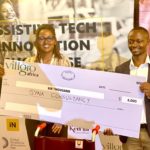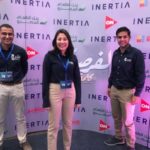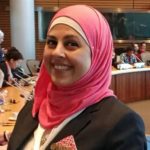Impact Stories from Environmental Sustainability Policy Area
Fellow empowers 120 girls with Green Tech Girls Summer Bootcamp
Fellow(s): Damilola Asaleye
Country: Nigeria
Cohort: 2020-2021
Policy Area(s): Economic Impact, Education Diplomacy/Mentoring, Empowering Women and Girls, Entrepreneurship, Environmental Sustainability, Professional Development, Professional Growth, Youth Engagement
Fellow Damilola Asaleye of Nigeria (2020-2021) recently helped produce the Green Tech Girls Summer Bootcamp, a five-day program for high school girls organized by the Girls and Women Technological Empowerment Organization (GWTEO).
The summer camp takes a holistic approach to activities relevant to girls and women that will enhance their self confidence and abilities to become sustainable technology leaders and change makers. Damilola, Co-Founder and Chief Operating Officer of Ashdam Solar Company, helped in the production of learning sessions on the topics of basic solar installation, upcycling, sustainable agriculture, financial literacy, information and communication technologies, leadership skills, teamwork, healthy living and visioning. The Green Tech Girls Summer Bootcamp is not the only stop on Damilola’s summer of women and girls’ empowerment. She is also taking part in the BEMORE Summer Bootcamp in Akure, Nigeria with close to 400 girls over the following weeks.
“My summer of impacting girls started yesterday Monday 15th August with the Green Tech Girls Summer Bootcamp,” Damilola recently shared, “and I’ve got my hyper attitude on with adrenaline pumping.”
Report Date...: 8/22/2022
Fellow publishes paper on magnetic field shielding
Fellow(s): Ibtihal Elshami
Country: Libya
Cohort: 2020-2021
Policy Area(s): Environmental Sustainability, Professional Growth
Libyan fellow Ibtihal Elshami (2020-2021) co-published an academic paper, “Magnetic Field Shielding Behavior of Mesh Wire in Low Frequencies”, in the July edition of leading electrical engineering journal, IEEE Xplore. Magnetic fields are waves that emit from many common electronics and wireless communication technologies. Shielding is necessary to reduce performance interference and cyber security risks. Additionally, overexposure to certain low frequency waves has been associated with potential elevated risk of some illnesses and cancers. Ibtihal’s research addresses the rapid adoption of electronic devices that complicate “our daily electromagnetic environment” and explores the under researched magnetic field shielding capacity of thin wire mesh on low frequency waves. Ibtihal has been an Assistant Professor at the Faculty of Electrical and Electronics Technology-Benghazi for eight years and has written several papers on the topic.
Read More »Report Date...: 7/25/2022
Fellow leads study that seeks to combat air pollution in Lahore
Fellow(s): Mifrah Ali
Country: Pakistan
Cohort: 2020-2021
Policy Area(s): Environmental Sustainability
Fellow leads research and development to combat air pollution
An environmentally focused research paper led by Pakistan’s 2020-2021 fellow Mifrah Ali was published in the May 2022 edition of the Multidisciplinary Digital Publishing Institute’s (MPDI) impact factor journal. The study, “Characterizing Air Pollution and Its Association with Emission Sources in Lahore: A Guide to Adaptation Action Plans to Control Pollution and Smog,” identifies low-cost means of monitoring air pollutants and reducing smog with remote sensing. Over a three-year period, Mifrah’s team at the University of Management & Technology in Lahore analyzed real-time remote sensor data on key emissions and pollutants, including carbon monoxide, nitrogen dioxide and methane, at 14 key sites around the region. The study found that “air pollution remained ‘unhealthy for everyone’ for 54% of the time, and ‘unhealthy for sensitive groups’ for 88% of the time.” By tracking specific pollutant concentrations as well as identifying hot spots and hot times, the researchers hope their findings will catalyze the development of “smart adaptation action plans for immediate implementation.”
Being a mother of two children, Mifrah experienced firsthand the adverse consequences of smog on the immune system. She says, “I felt a dire need to tackle this issue and motivate my colleagues toward multi-disciplinary collaboration.” Mifrah aims to limit air pollution and the spread of communicable diseases by “developing relevant mitigation devices, techniques, and filters for homes, specific industries and automobiles.” In addition to serving as a full-time faculty member at the University of Management & Technology, Mifrah also leads the Research and Innovation team at the startup ENERTEC, where she develops environmentally friendly products and energy generation technologies. She welcomes multi-disciplinary collaboration with like-minded academics and professionals involved in the fight for clean and breathable air.
Report Date...: 6/13/2022

Fellow awarded funding for assistive technology innovation
Fellow(s): Sylvia Nyaga
Country: Kenya
Cohort: 2022
Policy Area(s): Economic Impact, Entrepreneurship, Environmental Sustainability, Professional Growth
Syna Consultancy, founded and led by CEO, 2022 fellow from Kenya Sylvia Nyaga, recently won second place at the Assistive Technology Innovation Showcase in Kenya. Sylvia and her organization received $6,000 USD in funding to further their mission of providing equitable and inclusive water and sanitation services. Syna Consultancy’s “top priority is the achievement of access to safe and adequate all-inclusive water and sanitation paying special attention to the needs of marginalized groups” in rural and urban communities in Kenya. The showcase was hosted by Villgro Africa, a Nairobi-based impact investor and incubator whose focus is emerging healthcare businesses in Africa, in partnership with assistive technology accelerator Innovate Now and the Kenyan National Innovation Agency (KeNIA). Applicants were selected for their potential for impact and scalability, team and product strength and awareness of user needs. In addition to funding, Syna Consultancy and other winners gained access to investor networks from Villgro Africa, Innovate Now and KeNIA, as well as mentorship and training to solicit further funding and partnerships.
Read More »Report Date...: 5/23/2022

Fellow(s): Hamis Elgabry
Country: Egypt
Cohort: 2022
Policy Area(s): Economic Impact, Entrepreneurship, Environmental Sustainability, Professional Growth
2022 fellow Hamis Elgabry is part of the founding team of Mozare3, an agri-fintech platform that supports smallholder farmers with improved digitization, tracking, supplies and agricultural supervision. Recently, Mozare3 won first place at El Forsa, an Egyptian televised entrepreneurial competition. Hamis, the product development and innovation manager at Mozare3, is an agritech entrepreneur who specializes in water, climate and food security challenges. El Forsa, which airs on one of the largest channels in the Arab world, awarded Mozare3 over $50,000 as the first-place winner. Hamis was featured in a video promotion for the show, speaking about the company’s mission to empower small farmers through technology by providing them access to supplies, financial accounts and contracts on Mozare3’s mobile app. Hamis and the Mozare3 team, who just celebrated one year in business, will use the award prize to strengthen their Series A funding.
Read More »Report Date...: 4/18/2022

Fellow speaks about climate crisis at forum
Fellow(s): Davephine Tholley
Country: Sierra Leone
Cohort: 2018
Policy Area(s): Empowering Women and Girls, Environmental Sustainability, Professional Growth
2018 fellow Davephine Tholley presented at the NGO CSW Forum 66, an event hosted by the civil society branch of the UN Commission on the Status of Women (CSW). The two-week forum runs parallel to the official CSW session at UN Headquarters, bringing in civil society to engage in the CSW event’s sessions. Davephine is a civil engineer and current Chevening fellow pursuing a master’s in engineering business management at University of Sussex. Her event, Climate Crisis and Education: A woman’s voice included, was hosted by Graduate Women International (GWI) and brought together GWI representatives to speak about the climate crisis in their communities. In her presentation, Davephine spoke about the causes, consequences and possible solutions to the climate crisis in Sierra Leone. She explained that the climate crisis has resulted in extreme weather conditions in Sierra Leone including flooding, soil destabilization and water scarcity. She also shared solutions, outlining the roles that government, communities and corporations can take on in working towards change. “As women, we are most vulnerable when it comes to the consequences of climate change,” she said. “We have to be at the table contributing to these polices and implementing these initiatives.”
Read More »Report Date...: 3/21/2022

Emerging Leader shares her journey in science
Fellow(s): Naomie Kayitesi
Country: Rwanda
Cohort: 2022
Policy Area(s): Education Diplomacy/Mentoring, Empowering Women and Girls, Environmental Sustainability, Professional Growth, Youth Engagement
The TechWomen blog has published its final post for Emerging Leader Voices, a series that invites incoming Emerging Leaders to share about their background, their STEM careers and their paths to TechWomen. In Motivation, the pillar of my journey in science, 2022 Emerging Leader Naomi Kayitesi of Rwanda writes how the Genocide against the Tutsi and her country’s resilience in the face of tragedy inspired her to achieve: “I was blessed to grow up in the time where education was accessible to everyone as a right and not a privilege,” she writes. Naomie is currently pursuing her PhD, focusing on river hydrology and how rivers are affected by climate change. “Women are more affected than men by these environmental challenges, especially in developing countries, where women are responsible for farming, fetching water, and gathering fuelwood,” she writes. “Therefore, I am looking forward to meeting other women in STEM to brainstorm these topics. It is important to look beyond our boxes and discuss these global challenges, thus contributing to the global agenda.” Naomie concludes her blog post with a message of hope for the next generation of STEM leaders, especially women: “You are capable…believe in yourself and work hard.”
Read More »Report Date...: 2/14/2022

Fellow’s project named one of the 12 most anticipated buildings
Fellow(s): Noella Nibakuze
Country: Rwanda
Cohort: 2018
Policy Area(s): Economic Impact, Environmental Sustainability, Professional Growth
At the beginning of 2021, 2018 fellow Noella Nibakuze began working on the Rwanda Institute for Conservation Agriculture (RICA) in Bugesera as an architect for MASS Design Group, a Boston-based architecture firm that works to empower communities by using local and sustainable materials and uplifting their economies. By the end of the year, Noella was leading as project manager, and last month, RICA was named to the Architectural Digest 12 Most Anticipated Buildings of 2022 list. Bugesera, a region that lost half of its population during the Genocide against the Tutsi, is projected to see exponential growth over the next 30 years, causing stress on local food systems. Noella, who this month became a director at MASS, worked in partnership with The Howard G. Buffett Foundation and the government of Rwanda to design and build RICA, a campus that educates farmers and agricultural leaders in order to create sustainable food systems and ensure food security for all Rwandans. “RICA was master-planned, designed, landscaped, engineered, and built by MASS as an energy-independent and net-carbon zero complex of landscape, housing, education, storage, and processing, all supporting the plant- and animal-based studies of its future students, whose work will address this future food scarcity problem head-on,” says the Architectural Digest article.
Read More »Report Date...: 1/17/2022

Fellow selected as first recipient of the Kerr fellowship
Fellow(s): Rasha Abu Dayyeh
Country: Palestinian Territories
Cohort: 2017
Policy Area(s): Education Diplomacy/Mentoring, Environmental Sustainability, Professional Growth
2017 fellow Rasha Abu Dayyeh was named the first recipient of the University of California, Berkeley Kerr fellowship, a scholarship that supports professionals from the MENA region whose work focuses on the environment, natural resources and peace-building through environmental programs. The scholarship is part of the Beahrs Environmental Leadership Program (ELP), a UC Berkeley program founded in 2001 that has trained 731 professionals from 121 countries The Kerr fellowship was created in celebration of the ELP’s 20th year.
Rasha, a water and environmental engineer, was mentored at the San Francisco Public Utilities Commission during TechWomen 2017. During her professional mentorship she visited UC Berkeley, where she learned about Beahrs ELP. After returning to Ramallah – and after applying to Beahrs ELP every year – Rasha was finally accepted with a partial scholarship, but was unable to secure the funds to attend. After being named a recipient of the Kerr fellowship, Rasha began online classes this year, and hopes to be able to attend UC Berkeley for in-person courses next year. During the program, Rasha and a group of environmental leaders began Heroines of Earth, a project that amplifies women’s contributions towards defending the environment and creating a culture of sustainability. In a UC Berkeley feature, Rasha spoke about the importance of bringing international leaders together to create effective change: “The clock is ticking on climate change, and I believe in the power of collective action. To be able to heal the world, we all need to work together,” she said.
Report Date...: 11/22/21

With lessons from TechWomen fellow holds engineering event
Fellow(s): Lucy Mutinda
Country: Kenya
Cohort: 2016
Policy Area(s): Economic Impact, Entrepreneurship, Environmental Sustainability, Professional Growth
This week, 2016 fellow Lucy Mutinda co-organized the 28th Institution of Engineers of Kenya Conference, a five-day event themed on how engineers are accelerating sustainable economic recovery during the COVID-19 pandemic.
Lucy is the CEO and founder of Ecocycle, a company that provides zero-waste products and services. Founded in 2014, Ecocycle turns sewage into clean water, installs water recycling machines in homes and hotels throughout Kenya and promotes water re-use and environmental conservation. She is also the founder of Envirologic, a company that offers consulting services as well as a sustainable dry toilet system that functions without water or chemicals. Lucy serves as the first vice president of the Institution of Engineers of Kenya (IEK), and leads publicity, branding and marketing of all IEK partnerships and events. As she leverages social media to spread awareness about engineering in Kenya, Lucy is using skills she learned from TechWomen 2016: “I acquired my social media skills at the training that was delivered at Autodesk on the power of social media,” she said. “I have used those skills for my individual brand, my company and now IEK.”
Report Date...: 11/15/21

